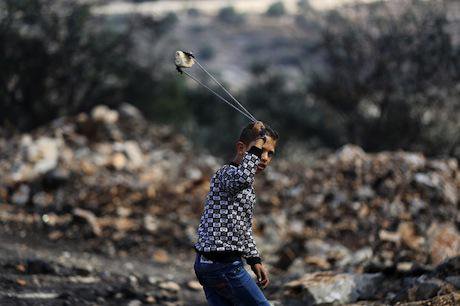
Palestinian boy with a slingshot. Ahmed Talat/Demotix. All rights reserved.
Israel’s reaction to Palestinians exercising the right to resist, a right enshrined in both the customs and treaties of international law, is nothing short of brutal. The past few weeks have seen an array of incidences highlighting the perversity of the Israeli forces’ suppression of peaceful protest: arbitrary arrests and detentions, tear-gassing of demonstrators and—in the tragic but sadly not unusual case of a teenager allegedly throwing stones—a fatal shooting.
These events are all too common in the Occupied Territories, their victims often children and young adults who, despite the IDF’s frequent and well-known violations against innocent civilians, boldly persist in their struggle for freedom. The continuing denial by Israel of the applicability of international humanitarian law to the Occupied Territories, serves as the framework in which it sustains its ongoing regime of criminalisation.
By criminalising non-violent resistance activities, effectively attempting to stifle the Palestinian psyche, Israel advances what Jeff Halper has aptly labelled its “matrix of control”—a complex web of legal, architectural and systemic devices designed to fragment and isolate Palestinian society.
Additionally, the international discourse, particularly coverage by western media outlets, serves to perpetuate and further solidify the stereotype of the Palestinian ‘terrorist’, discounting the severity of the apartheid regime, disregarding the relevant international treaties—and thereby discrediting the right to resist.
Relevant law and custom
As well as refusing to distinguish between legitimate armed struggle and acts of terror, Israel’s constant suppression of non-violent protest highlights its attempts to completely delegitimise the right of the Palestinian people to self-determination.
Article 1 of the International Covenant on Civil and Political Rights (ICCPR), which was ratified by Israel in 1966, states that “all peoples have the right to self-determination.” It elaborates the right to “freely determine their political status and freely pursue their economic, social and cultural development”.
The Universal Declaration of Human Rights (UDHR)—which together with the ICCPR, UN Charter and customary law, makes up the body of international human rights law—guarantees the “freedom to hold opinions without interference and to seek, receive and impart information and ideas through any media and regardless of frontiers”. The right to peaceful assembly—again, enshrined in both the UDHR and ICCPR—is inviolable, but for necessary “national security” interests.
What is more, the myriad of UN General Assembly resolutions that explicitly recognise the “legitimacy of the people’s struggle for liberation from colonial and foreign domination...by all available means” only strengthens the legal basis for the right to resist.
Resolution 2787 refers specifically to the ‘Palestinian people’. Whilst not carrying binding legal force, these resolutions reflect the views of the majority of sovereign states, which form the basis of customary international law. This is applicable regardless of whether or not it has been codified.
In the sphere of customary international law, the Advisory Opinion of the International Court of Justice also merits attention. In 2004, it issued its opinion against the Separation Wall, stating that the path of the Wall—80 percent of which runs through Palestinian land, well outside of Israel’s internationally recognised borders—is illegal.
It emphasised Israel’s obligations to “terminate its breaches of international law” and cease construction of the Wall, as well as to make adequate compensation to Palestinians for the damage caused. The ICJ’s report also declared as illegal the building of Israeli settlements inside the Occupied Territories, confirming the applicability of the Fourth Geneva Convention of 1949, which states that an occupying power must not move its civilians into the occupied territory.
In light of Israel’s endless list of violations against the Fourth Convention, the existence of a parallel moral right to resist becomes obvious, especially given that numerous UN bodies have unequivocally stated that international humanitarian law (including the Geneva Conventions), as well as international human rights law, must be observed by Israel as an occupying power.
Just last October, the UN Human Rights Committee—in its fourth periodic review of Israel—strongly rejected Israel’s claim that the ICCPR does not apply to the Occupied Territories. Paragraph 5(b) of the Committee’s Concluding Observations stated that Israel must “acknowledge that the applicability of international humanitarian law...in a situation of occupation, does not preclude the application of the ICCPR.” The “right to protest”, therefore, though not mentioned per se in the legal apparatus, derives from the relevant legal norms and is guaranteed by these provisions.
Suppression and criminalisation
Evidently, Israel denies that the norms of international law apply to its practices in the West Bank. Forty-eight years after UN Security Council Resolution 242, instructing Israel to leave the Occupied Territories, the Wall still stands, cutting through the West Bank and devastating the lives of those that live in its shadow.
The ongoing construction of the Wall, of the settlements, of the various architectural elements that have come to shape what is described by Federica D’Alessandra as Israel’s “alternative legality”, demonstrates the extent of the denial. The Palestinian civilians who reject this false legality and decide to resist are met with disproportionate force from the military.
Last month, nineteen-year old Jihad al-Jafari, a resident of Deheishe refugee camp in Bethlehem, was shot dead by Israeli forces that had raided the camp. Muhanad Quasi, the victim’s neighbour, said, “Israeli soldiers prevented anyone from reaching or rescuing him. They fired at anyone who would get close to help him.”
Deheishe refugee camp is accustomed to routine raids by the military, and stone throwing is a popular way of denouncing this practice. Viewed by many as a rite of passage, its metaphorical significance cannot be understated. It was the primary method of resisting during the first intifada, and carries a uniquely Palestinian history, more an act of defiance as opposed to an intention to actually injure. The ruthless killing of a young man by fully armed, helmeted soldiers, however, is unthinkable as a response.
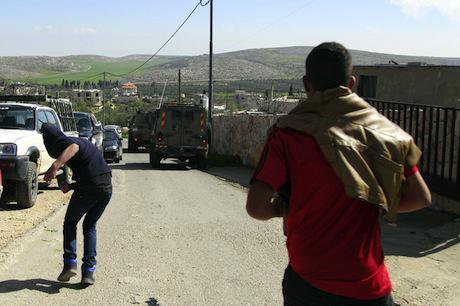
Mahmoud Illean/Demotix. All rights reserved.
November of last year saw the Israeli cabinet pass a bill that, if approved, could mean twenty-year prison sentences for those charged with stone throwing. Approximately 700 children are annually sentenced for this ‘crime’ in the Occupied Territories. From an international law standpoint, this simply cannot be justified.
The international jurist Professor Emeritus Eric David of Brussels University, deems the IDF a “legitimate target” and asserts that “of course they (stone-throwing Palestinians) are allowed to do that...certainly not only from a jus contra bellum point of view, but also from a jus in bello point of view”. These are the two separate strands of the laws of war; Professor David legitimises stone throwing as protest in the face of military violations from the perspective of both strands.
The laws of war, by virtue of the Fourth Geneva Convention, authorise occupying powers to establish military courts for the civilians under occupation. The practices of the Israeli occupation forces, however, go far beyond the jurisdiction that is permissible and amount to grave human rights violations.
On February 16, eighteen year-old Lina Khattab, former student of Birzeit University, was given a sixth-month prison sentence after being tried in an Israeli military court. She was charged with “throwing stones” and “participating in an unlawful demonstration”, the only evidence against her being the testimonies of three Israeli soldiers.
The Israeli ban against demonstrations is but one example of the hundreds of military orders that strip the Palestinians of autonomy and illustrate just how far the regime extends. Military Order 101 forbade the gathering of more than ten people at a time. Order 107 prohibited a range of schoolbooks, including those on Arab grammar, the Crusades, and Arab nationalism. Order 1079 published a list of over a thousand banned items pertaining to Palestinian novels and poetry.
Resistance in all its forms is penalised.
Addameer, the leading prisoner support organisation operating in the West Bank, said that the arbitrary charges levelled towards Palestinians signify an “attack on the social fabric of Palestinian society”. Prior to receiving her sentence, Lina was held in administrative detention, which is known for its brutal procedures. “Detainees get told they won’t get fed until they confess, they’re told their houses will be demolished, their families are often threatened.”
When put on trial, the astonishing conviction rate of 99.74 percent ends any debate as to the legality of the regime. Students, farmers, ordinary men, women and children who resist in the face of great injustice—they are all convicts long before reaching court, prisoners of a system that deliberately and routinely turns them into criminals.
International discourse
The international community’s failure to compel Israel to observe the law allows this criminalisation to persist. The dominant discourse of the west obscures the lived reality of millions of Palestinians. Its tropes and terminology falsely depict each new incident as yet another phase of the ‘cycle of violence’ that plagues the region and, as Rashid Khalidi writes, “as though it is impossible to ascribe cause and effect to what is happening.”
In late 2013, the British centre-left newspaper, The Guardian, published an article about tensions caused among Israelis upon the release of Palestinian prisoners. It referred to the prisoners as “terrorists” without the use of quotation marks. A seemingly minor blunder, this is the type of subtle, pro-Israeli propaganda that enables Israel’s continued impunity and without question negates the Palestinian struggle.
It creates a narrative in which the notion of a Palestinian right of resistance becomes irrelevant; it is instead hijacked by the normalised conception of the ‘terrorist’ who warrants no sympathy. This is evident from UK Prime Minister David Cameron’s speech at Downing Street late last year, where in honour of the Chanukah holiday he addressed several representatives of the Jewish community:
“There is no moral equivalence between an Israeli government that wants to defend its people and its territory against attack, and terrorists that want to kill as many people as they can with the weapons and the bombs and the missiles that they throw over Israel’s borders.”
The refusal to contextualise, to even mention by name the Palestinian people, is striking. Last summer, in the wake of Israel’s Operation Protective Edge against Gaza, Human Rights Watch failed to hold Israel accountable for its conduct. Through the vague language of its press releases—that of “may be”, “apparent” and “appears”, Human Rights Watch “distanced itself from alleging Israeli war crimes”, as Norman Finkelstein has written.
These “muted legal findings” are irresponsible on the part of an international human rights organisation, and only play into the myth that the complexity of the conflict makes it impossible to be objective.
The right of resistance of the Palestinian people is grounded in law, custom and conscience. It is the moral duty of international organisations, governmental or non-governmental, to recognise this right, and aim to facilitate a dialogue which reflects the reality of the situation in the Occupied Territories.
Meanwhile, it is the moral duty of us all to think historically, critically and compassionately about the apartheid in Palestine, and heed the words of Nelson Mandela in 1997:
“We know too well that our freedom is incomplete without the freedom of the Palestinians.”
Read more
Get our weekly email
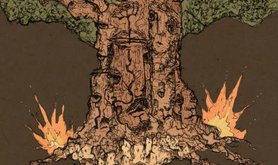

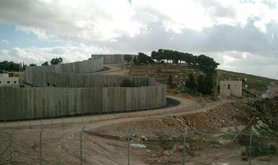
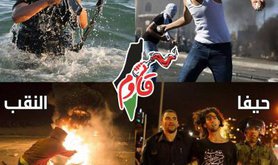
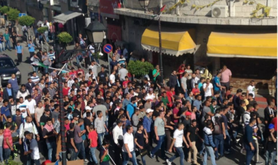
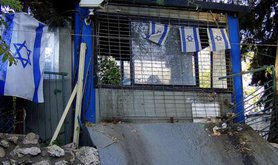

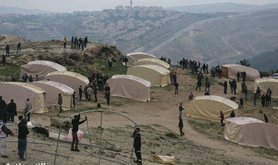
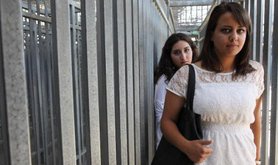
Comments
We encourage anyone to comment, please consult the oD commenting guidelines if you have any questions.